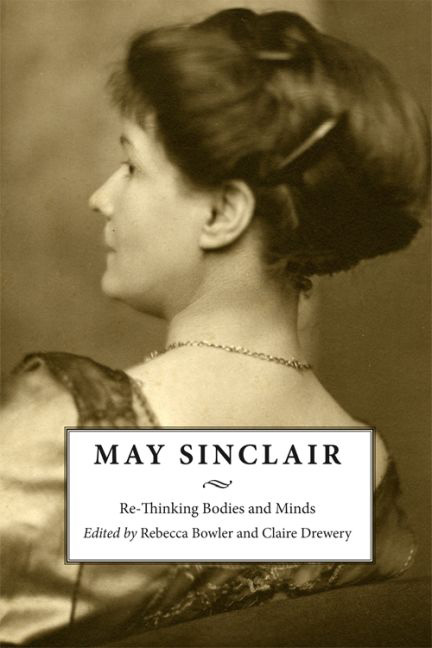Book contents
- Frontmatter
- Contents
- Acknowledgements
- Introduction: May Sinclair's Interdisciplinarity
- Part I The Abstract Intellect
- 1 ‘Dying to Live’: Remembering and Forgetting May Sinclair
- 2 Learning Greek: The Woman Artist as Autodidact in May Sinclair's Mary Olivier: A Life
- 3 Portrait of the Female Character as a Psychoanalytical Case: The Ambiguous Influence of Freud on May Sinclair's Novels
- 4 Feminism, Freedom and the Hierarchy of Happiness in the Psychological Novels of May Sinclair
- 5 Architecture, Environment and ‘Scenic Effect’ in May Sinclair's The Divine Fire
- Part II Abject Bodies
- Notes on Contributors
- Index
1 - ‘Dying to Live’: Remembering and Forgetting May Sinclair
from Part I - The Abstract Intellect
Published online by Cambridge University Press: 26 May 2017
- Frontmatter
- Contents
- Acknowledgements
- Introduction: May Sinclair's Interdisciplinarity
- Part I The Abstract Intellect
- 1 ‘Dying to Live’: Remembering and Forgetting May Sinclair
- 2 Learning Greek: The Woman Artist as Autodidact in May Sinclair's Mary Olivier: A Life
- 3 Portrait of the Female Character as a Psychoanalytical Case: The Ambiguous Influence of Freud on May Sinclair's Novels
- 4 Feminism, Freedom and the Hierarchy of Happiness in the Psychological Novels of May Sinclair
- 5 Architecture, Environment and ‘Scenic Effect’ in May Sinclair's The Divine Fire
- Part II Abject Bodies
- Notes on Contributors
- Index
Summary
Virginia Woolf did not think much of May Sinclair. When she had tea with her in 1909, she wrote to Lady Robert Cecil that Sinclair was a ‘woman of obtrusive, and medicinal morality’ with ‘little round eyes bright as steel’ (Woolf 1976: 390). But Woolf was famously catty about writers with whom she felt a sense of rivalry, and it was Sinclair, not Woolf, who was the first of the pair to publish an experimental, streamof- consciousness novel (Mary Olivier: A Life, in 1919). The two writers had more in common than Woolf would care to admit. Both were interested in reproducing the texture of the inner world; both were preoccupied with the psychology of women; and both sought to explore the process and experience of memory: the ‘present sliding over the depths of the past’, as Woolf would put it years later in her memoir (Woolf 1985: 98). In 1917, Sinclair imagined what it might be like if we had no psyche to select and shape what we remember:
Suppose that we remember, never because we choose, but always because we must […] then our consciousness would be like nothing on earth but an immense fantastic telephone exchange; an exchange where messages, indeed, received and registered and answered themselves, but all at once, and in overwhelming multitudes; an exchange deafened and disorganised; bells ringing incessantly all through its working hours; messages rushing in from all parts of the city and suburbs at once, crossed and recrossed by trunk calls from all parts of the outlying country; casually crossing and recrossing, interrupting and utterly obliterating each other. (Sinclair 1917: 104–5)
Sinclair suggests that not the brain but the psyche brings order to this potential chaos: ‘the psyche uses the brain, and the memories which have become the habits of its body and its brain, as its machine, and its vehicle; and […] the secret of its remembering and forgetting is its own’ (Sinclair 1917: 105). Sinclair favoured the idea that ‘psychical disposition’ (Sinclair 1917: 105– 6) working through ‘an act of will’ (Sinclair 1917: 17) could free the consciousness from the burden of the past, but she was not entirely sure that this idea was right. Indeed, she spent much of her career – at least after 1914 – preoccupied with how to manage her relationship to the past.
- Type
- Chapter
- Information
- May SinclairRe-Thinking Bodies and Minds, pp. 21 - 38Publisher: Edinburgh University PressPrint publication year: 2017



